
From Matangi Tonga Magazine Vol. 14, no. 3, December 1998.

By Pesi Fonua
A business venture in Mainland China turned into a diplomatic mission for Princess Pilolevu and her team.
Tonga has severed its long-standing relationship with Taiwan and established new links with Mainland China in a diplomatic reshuffling that will not only give Tonga better access to the United Nations, but is a move that the King believes will open up greater opportunities for Tongan missionaries and business.
TongaSat, the company that looks after the Tonga registered satellite slots, has played a major role in the transition.
The move, according to Princess Pilolevu, the Chairperson of TongaSat, and the person whom King Taufa‘ahau Tupou IV gave a mandate in 1996 to normalise the relations between Tonga and the People’s Republic of China, “is the first step for Tonga to become a full member of the United Nations.” Princess Pilolevu said that by establishing diplomatic relations with China the King therefore acknowledged to the world, that Tonga recognises the United Nations Charter, that there is one China, and that Tonga’s long-standing friend Taiwan is a part of China. “It is one of the most courageous decisions that His Majesty has made.”
Tonga’s newly appointed Minister of Foreign Affairs, the King’s youngest son, Prince ‘Ulukalala Lavaka-Ata flew to Beijing and signed a joint communiqué on October 26, which declared that: “the Kingdom of Tonga recognises that the Government of the People’s Republic of China is the sole legal government representing the whole of China and, that Taiwan is an inalienable part of the Chinese Territory.”

Both Chinas
Princess Pilolevu said that during the King’s visit to Mainland China last July, “at most of the banquets he publicly said that China and Taiwan should talk to each other. He also told them that he was going to call on President Lee Teng Hui in Taiwan, and he did. He was the first head of state to visit both Chinas on the same trip.
“His Majesty asked both President Jiang Zemin in Beijing, and President Lee Teng Hui in Taipei if there was anything that he could do to bring the two Chinas closer together. He was very emotional about it,” she said.
“In Taipei His Majesty told President Lee Teng Hui that he was going to normalise relations with China. He said this was a political decision that would allow Tonga to become a fully-fledged member of the United Nations, in order to reap as much benefit as possible out of the UN and various other associations.”
Princess Pilolevu’s team, who work out of Hong Kong and Tonga, includes: Fred Wang, her Chinese business partner, Sione Kite, the managing director of TongaSat, who is a former Tongan High Commissioner in Europe, and Anna Tupou, the marketing manager of TongaSat.
Missionaries
“I believe that God invented us to do this work otherwise we could have become just another foreigner knocking on doors in Beijing for years without having a chance to meet the leaders of China. We are honoured that we became part of His Majesty’s vision for Tonga’s future.”
The Royal Family sees more to China than just business opportunities, and it might soon become a new destination for Tongan missionaries.
“I look upon this new relationship with China as a mean of spreading the Lord’s words to China. When China opens its door to Christian evangelists, Tonga should be right there by the door,” Princess Pilolevu said.
“Business—fine, normalising relations—true, but this is what I have been looking at, because His Majesty’s vision is for Tongans to be evangelists, for Tonga to be an evangelist country to spread the word, I truly see this as an opportunity for all good Christians in Tonga.”
Princess Pilolevu believes that they have already made some headway in spreading Christianity in China, which is not a Christian country. She first asked to say a prayer at the beginning of every major meeting they had, and the Chinese allowed it to happen.
“Now I don’t have to ask, they ask me to say grace. From the Great Hall of the People, to the Ministry of Foreign Affairs, to dinners at State Guesthouses, everywhere. Most of these important dialogues are always over a meal or dinner. During all these banquets, in the first year, I always asked to say grace. This year, they have asked me to say grace. I realised that it is their form of showing respect to us.
“They are not religious, but they show respect for our need to say grace. They don’t have a 5,000-year-old history for nothing, and they can see you through.”

Bronze statue
Tonga officially established a diplomatic relationship with China on November 2 when Tonga’s Minister of Foreign Affairs and Defence, Prince ‘Ulukalala Lavaka Ata made the announcement in the palace grounds, Nuku‘alofa. The occasion was marked with the unveiling of a bronze statue of King Taufa‘ahau Tupou IV, a gift from the People’s Republic of China.
On the same morning about half a mile away along the Nuku‘alofa waterfront the Republic of China’s red and blue flag was lowered, and their ceramic name plate was chiselled off from the entrance to the former embassy. A television crew from Taipei who were filming the unveiling of the King’s statue was asked to leave the Palace grounds, but later were allowed back in by the Prime Minister Baron Vaea.
The Queen frequently used a handkerchief to dry her eyes during the formal ceremony at which Tonga’s Minister of Foreign Affairs, and China’s Vice Minister of Foreign Affairs, Mr Jiechi Yang, made speeches hailing signing of the joint communiqué between China and Tonga. China now has relations with 11 countries in the South Pacific.
The sudden announcement came as a surprise to most Tongans, following the extensive publicity of the colourful visit to Taiwan by the King and Queen of Tonga in July. It came less than a year after the Taiwanese moved into their new embassy a newly built $2.5 million property, which they rented or leased from the business interests of Tonga’s Minister of Foreign Affairs at the time, Crown Prince Tupouto‘a.
Tonga first established diplomatic relations with the Republic of China, Taiwan, in 1972, and it was the only diplomatic mission in Tonga on an ambassadorial level.
Princess Pilolevu recalled that the whole normalisation process began to polarise following her first visit to Beijing in 1996, “to do business, satellite business. (See Long march towards a globa telecom network) Sione Kite, ‘Ana Tupou and myself at first did not realise the calibre of the people that we were talking to.” She said it did not take them long to realise that, “they were very high people, in government, some are still in government and some have retired. We also found out that almost everything in China is either owned and run by government, or that government is the major shareholder.”
When Princess Pilolevu told the King about her visit to China and the kind of people that she met there, “that was the beginning of it. His Majesty gave me a mandate, to try and normalise the relationship between Tonga and China. He thought it would be easier for my colleagues and myself because we were in business and we were in China for business. Also His Majesty is always very conscious about the government’s lack of funds for this kind of project.”
Since 1996 the team has visited Beijing six times. The China Association for International Friendly Contact introduced them the head of the Kaili Company, “which manufactures everything from communication equipment to fishing rods. They own hotels, restaurants, and paper mills.
“The Association is responsible for almost all the official visits to China, especially for visitors who have no diplomatic ties with China. They wanted to do the sculpture as their gift to His Majesty. Professor Chang who is the top and the most respected sculptor in China, who has made important sculptures of Mao, Deng Xiaoping, Chou en-lai, and the Lady of Peace at the Peace Park in Hiroshima, made it. He has been to Tonga twice.”
The TongaSat team arranged an unofficial visit to China by the King last year to receive this Bronze Statue. “I think it was a very important part of the normalisation process because it meant that while His Majesty was in China he met President Jiang Zemin, he was also given full honours. This is what I found wonderful about the Chinese. We had no diplomatic relations with China and yet they gave full Head of State honours, hosting them at their State Guest House, giving them escorts in Hong Kong and in China, and arranging for the King to meet the President and the Minister of Foreign Affairs, (who is now Vice Premier Tang Jiaxuan).
“His Majesty and Jiang Zemin in the course of two years have written very warm letters to each other.”
Princess Pilolevu said that in the beginning they were talking only to the China Association, then during the King’s visit the Chinese Ministry of Foreign Affairs came in. We both agreed that in the final stage of our negotiations we would bring in the Ministry of Foreign Affairs of Tonga.”
Tonga’s newly appointed Minister of Foreign Affairs, the King’s youngest son, Prince ‘Ulukalala Lavaka-Ata flew to Beijing and signed a joint communiqué on October 26, which declared that: “the Kingdom of Tonga recognises that the Government of the People’s Republic of China is the sole legal government representing the whole of China and, that Taiwan is an inalienable part of the Chinese Territory.”


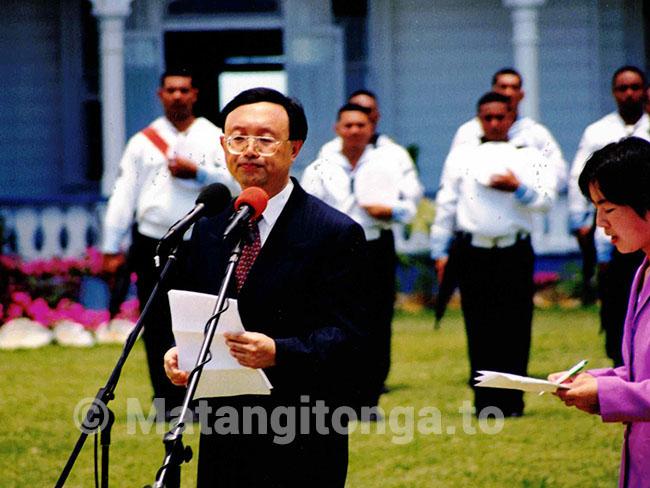
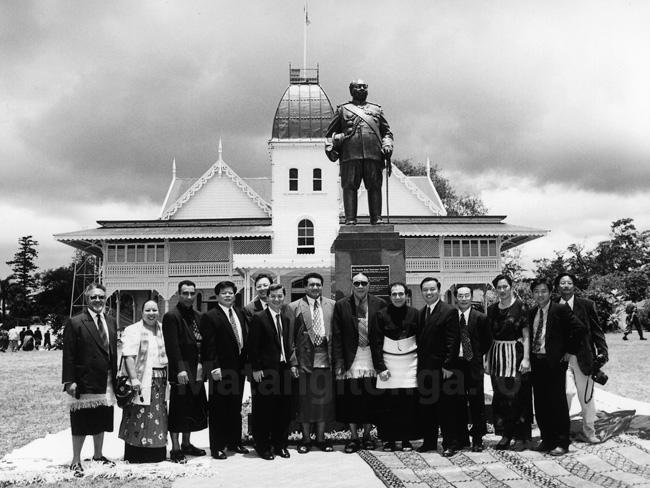
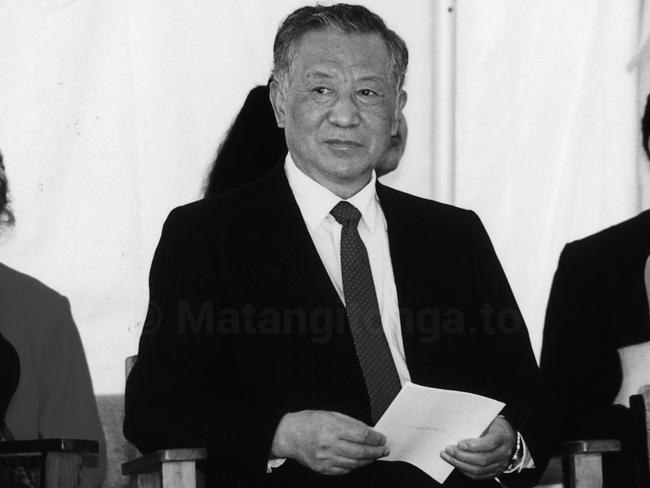
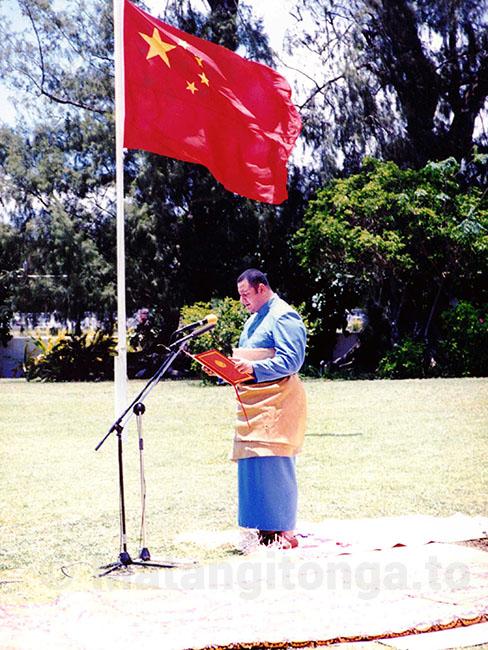
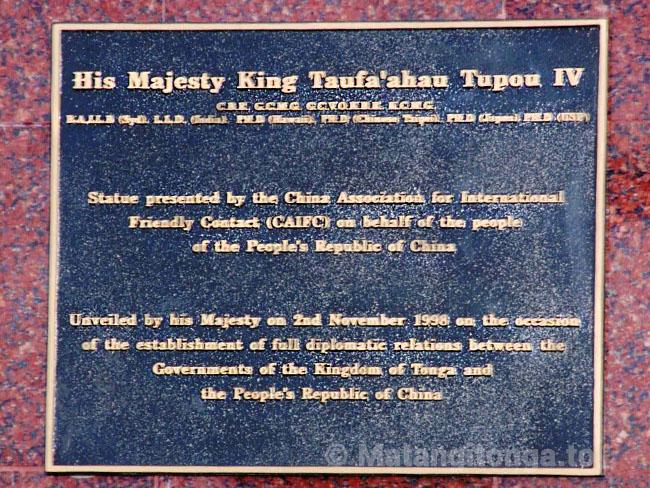


Comments
I wonder how the Tongan
I wonder how the Tongan missionaries are faring in converting Chinese to Christianity when Europeans have failed for hundreds of years.
I have often thought of this article and I'm glad that you have put it up Matangitonga.
Truth be told there never was
Truth be told there never was any missionaries it was a convenient excuse. I'm sure some people have benefitted from ties with China.